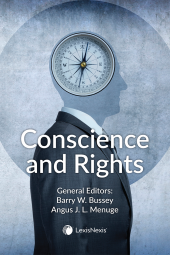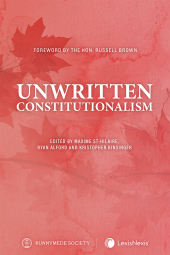Conscience and Rights
One Year Subscription Only Terms
Subscribers receive the product(s) listed on the Order Form and any Updates made available during the annual subscription period. Shipping and handling fees are not included in the annual price.
Subscribers are advised of the number of Updates that were made to the particular publication the prior year. The number of Updates may vary due to developments in the law and other publishing issues, but subscribers may use this as a rough estimate of future shipments. Subscribers may call Customer Support at 800-833-9844 for additional information.
Subscribers may cancel this subscription by: calling Customer Support at 800-833-9844; emailing customer.support@lexisnexis.com; or returning the invoice marked 'CANCEL'.
If subscribers cancel within 30 days after the product is ordered or received and return the product at their expense, then they will receive a full credit of the price for the annual subscription.
If subscribers cancel between 31 and 60 days after the invoice date and return the product at their expense, then they will receive a 5/6th credit of the price for the annual subscription. No credit will be given for cancellations more than 60 days after the invoice date. To receive any credit, subscriber must return all product(s) shipped during the year at their expense within the applicable cancellation period listed above.
Product description
Why should the law take claims of conscience seriously?
This is not an easy question to answer because there are many different accounts of what the conscience is, and many different views of the authority of conscience. Is conscience a faculty capable of moral knowledge, or merely a vague term for subjective moral feelings? Do conscience claims deserve public recognition and legal protection, or are they just expressions of private convictions?
One thing seems clear. A free society governed by the rule of law should avoid two extreme views of the conscience. At one extreme lies totalitarianism, in which individual conscience has no weight at all: central government is entitled to make one-size-fits-all laws for the good of the state, and conscientious objection is criminal defection. Yet, at the other extreme, conscience is divinized, treated as the very voice of God, and this may result in an antinomian, chaotic individualism. If anyone can defect from any law to which they conscientiously object, how can there be a society?
This collection was developed from the International Association for Philosophy of Law and Social Philosophy (IVR) World Congress in Bucharest, Romania in 2022. The essays take a fresh look at the nature and authority of conscience, and consider the extent to which the law should recognize claims of conscience.
The Collection of Papers
- Angus J. L. Menuge and Barry W. Bussey − Introduction
- Paul Copan − Some Preliminaries on Conscience, Morality, and the State
- David Guretzki − Three-Dimensional Conscience: A Theo-Legal Proposal for Testing Conscience Claims
- Hendrik Kaptein − Conscience Inside Out: From Inner Compunction to Common Reason in Action
- Michał Rupniewski − Understanding Fundamental Rights: The Role of Conscience
- Barry W. Bussey − The Independence of Judicial Conscience
- Justice Dallas K. Miller and Angus J. L. Menuge − Public Policy in Crisis: When May the Government Override Rights of Conscience?
- Claudia Mariéle Wulf − The Inner Compass and the Outer Law: Insights into Functions and Malfunctions of the Conscience
- Brian Bird − Conscience and Democracy
- Andy Steiger − Rights and Responsibilities of Conscience: The Courts Cannot Have It Both Ways
- Janet Epp Buckingham − Medical Conscience Rights (and Wrongs) in Canada
Table of contents
TABLE OF CASES
INTRODUCTION
PART I: THE NATURE AND AUTHORITY OF CONSCIENCE
PART II: CONSCIENCE AND THE RULE OF LAW
PART III: DILEMMAS OF CONSCIENCE
 Lexis Nexis
Lexis Nexis 


